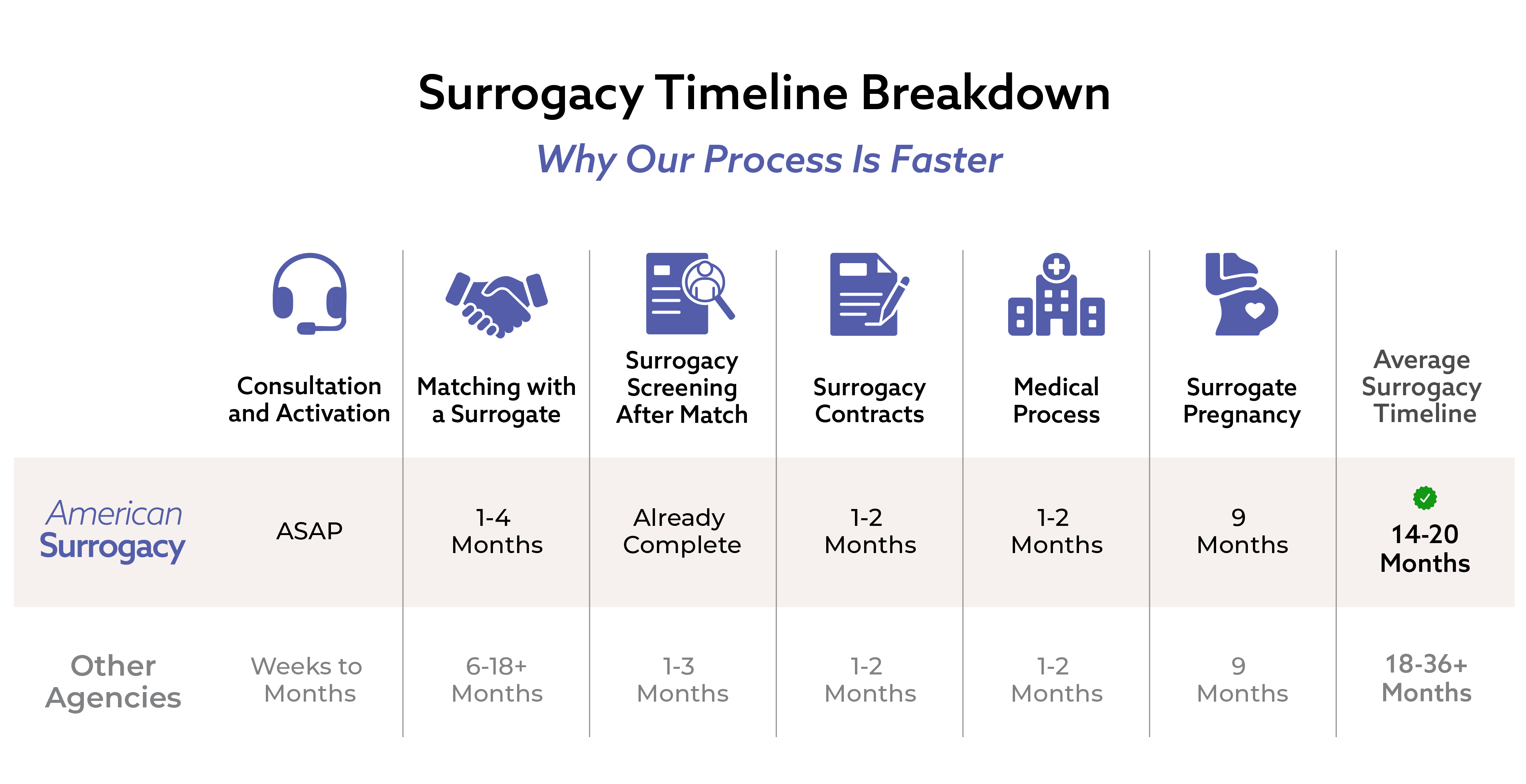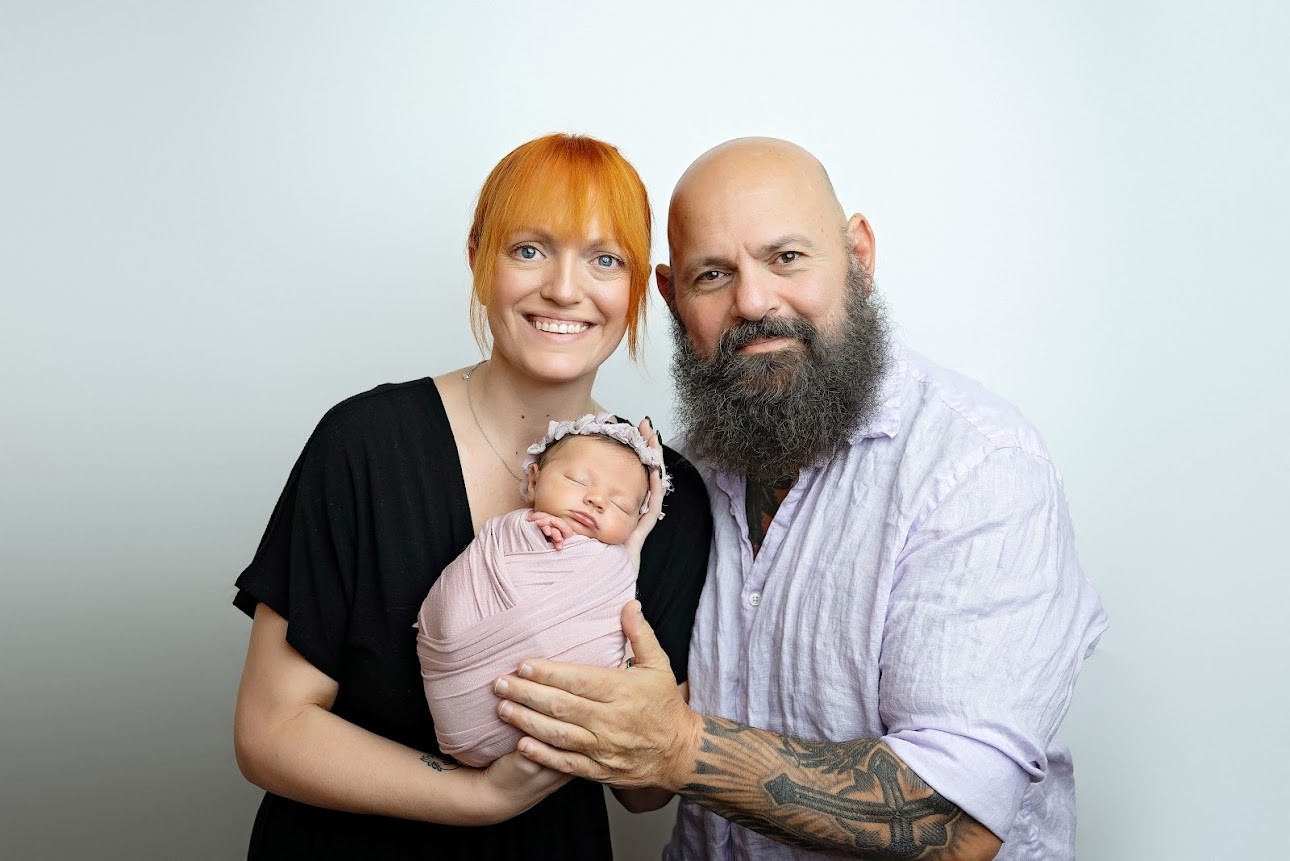Having a baby when you have type 1 diabetes involves complexities that many healthcare providers now address through surrogacy. Gestational surrogacy lets you have your own child without the risks that T1D can create during pregnancy.
Exploring your options? Connect with American Surrogacy today and talk with specialists who understand what it's like to navigate family planning with a chronic condition.
This guide covers why T1D affects pregnancy, when doctors might suggest surrogacy as an alternative, and how gestational surrogacy works while still giving you a child that's genetically yours. We'll also walk through the surrogacy process when you have diabetes and how American Surrogacy helps families work through these decisions.
Type 1 Diabetes Pregnancy Risks: Why Blood Sugar Control Isn't Enough
When you have T1D, pregnancy involves challenges that go beyond what most people face. Your body's insulin production issues affect pretty much every aspect of pregnancy.
Even when you're managing your blood sugar well, diabetes still increases certain pregnancy risks. Those glucose fluctuations you deal with? They can impact how your baby develops from the very beginning. This isn't about whether you're healthy enough to be a parent—of course you are. It's more about figuring out the best way to get there.
Maternal and Fetal Complications of Type 1 Diabetes in Pregnancy
Diabetes during pregnancy can create a chain reaction of concerns that need constant attention. Both you and your baby face some increased risks, even when you're doing everything right with your diabetes care.
What T1D pregnancy can involve:
- Diabetic ketoacidosis that might require hospital care
- Severe low blood sugar episodes
- Faster progression of eye, kidney, or heart issues related to diabetes
- Higher chance of developing preeclampsia
- More likely to need a cesarean delivery
For your baby, high blood sugar early in pregnancy can increase the risk of heart, spine, or brain development issues. Throughout pregnancy, blood sugar swings can cause babies to grow larger than normal, which often means cesarean delivery and can lead to birth complications.
Babies born to mothers with T1D are more likely to come early and might need some extra care in the NICU. Even with great prenatal care, there are still some increased risks for mothers with diabetes.
IVF Success Rates and Type 1 Diabetes: When Hormones Disrupt Blood Sugar Control
If you've been trying to get pregnant and considering IVF, having T1D adds another layer of complexity. The hormone medications used in IVF can mess with your blood sugar control, making it tough to keep your glucose levels where they need to be for both IVF success and your own wellbeing.
IVF tends to be less successful when you have diabetes, particularly if keeping your blood sugar stable has been challenging. The stress of multiple cycles, hormone shots, and blood sugar ups and downs can affect egg quality and how likely implantation is to work.
A lot of reproductive doctors are finding that when IVF hasn't worked after several tries, surrogacy often becomes a more practical path forward.
Medical Criteria for Surrogacy Recommendation in Type 1 Diabetes Patients
Doctors are suggesting surrogacy more often for people with T1D when certain factors add up. Your medical team considers several things when deciding whether pregnancy might pose too many risks.
Doctors often suggest surrogacy when you have:
- Had T1D for more than 10 years with some complications developing
- A1C levels that stay above 7% even with your best efforts
- A history of severe low blood sugar or ketoacidosis episodes
- Diabetes-related problems with your kidneys, eyes, or heart
- Had pregnancy loss or complications before that were related to diabetes
- Other conditions like high blood pressure or kidney problems
The conversation usually comes down to one main question: based on your specific health situation, would trying to get pregnant put you at too much risk for serious complications? When the answer is yes, surrogacy offers another way to have the family you want while keeping you safer.
It's not about giving up—it's about being practical about the best path forward.
Gestational Surrogacy: Maintaining Genetic Connection with Type 1 Diabetes
One important thing about gestational surrogacy: having diabetes doesn't change the fact that you can have a child who's completely yours genetically. With IVF, doctors take your eggs and fertilize them with your partner's sperm (or donor sperm if needed) to create embryos. Those embryos go to a gestational surrogate who carries the pregnancy for you.
If you've already done IVF cycles and have frozen embryos, those can be used for surrogacy. The surrogate doesn't have any genetic connection to your child—she's just providing a healthy environment for your baby to develop without the blood sugar issues that could affect growth.
This genetic connection is usually what people worry about most when they first think about surrogacy. Your child will look like you and your partner and have your family traits. The difference is just that development happens in an environment where diabetes isn't a factor.
Surrogacy Process for Intended Parents with Type 1 Diabetes
The surrogacy process when you have T1D follows the same basic steps as any surrogacy, with a bit more attention to your medical history and needs. At American Surrogacy, we know your path here probably included some setbacks, tough conversations with doctors, and maybe some unsuccessful attempts at pregnancy or IVF.
Here's your step-by-step surrogacy process:
- Step 1: Initial Consultation We go over your medical situation and T1D history to understand your specific needs.
- Step 2: Medical Team Coordination We work with your current medical team and fertility specialists to ensure seamless care.
- Step 3: Surrogate Matching We match you with a pre-screened surrogate who's comfortable with medical complexity.
- Step 4: Legal Contract Development We draw up legal contracts that address your specific needs and protect your parental rights.
- Step 5: Embryo Transfer Process Embryo transfer happens using your genetic material with the right medical support.
- Step 6: Pregnancy and Birth Support We provide ongoing support throughout pregnancy and delivery.
During matching, we connect you with a surrogate who understands your situation and is comfortable with the medical aspects. Legal contracts cover your specific needs, including decision-making and making sure your parental rights are fully protected.
Throughout the process, our team provides support that acknowledges how challenging family building can be when a chronic condition has created obstacles.

A lot of intended parents tell us that surrogacy finally gave them some control back over their family-building process after diabetes had taken away so much of that control.
Surrogate Matching for Type 1 Diabetes: American Surrogacy's 4-Month Average
American Surrogacy's matching process for intended parents with diabetes focuses on finding surrogates who genuinely want to help families work around medical barriers. Our average matching time is 1 - 4 months because we work with a strong network of pre-qualified surrogates who've already said they're open to working with intended parents facing health challenges.
When matching, we look for surrogates who took good care of themselves during their own pregnancies and understand the role they're playing in your family building.
We set up meetings so you can find someone whose approach feels right for your situation, and we make sure she's geographically accessible to your medical team and comfortable with any extra monitoring your fertility doctor might want.

2 Months

1 Month

3 Weeks
Surrogacy Costs vs. High-Risk Type 1 Diabetes Pregnancy Medical Expenses
Surrogacy does require a significant financial investment, but many intended parents with diabetes find the costs work out similarly to what extensive medical management, potential complications, and NICU stays for high-risk T1D pregnancies often cost.
American Surrogacy's program fees run $100,000 - $200,000+, which covers comprehensive support throughout your experience.
This includes surrogate compensation, medical expenses during pregnancy, legal fees, and our agency support services. Unlike the unpredictable costs that can come up with diabetes pregnancy complications—long NICU stays, emergency cesareans, treatment for maternal complications—surrogacy costs are mostly predictable and planned out ahead of time.
Surrogacy Financing Options for Type 1 Diabetes Patients
We know that living with diabetes has probably already meant significant medical expenses throughout your adult life. American Surrogacy works with Sunfish to offer fertility financing designed specifically for surrogacy, with payment plans that can make your family-building goals more financially doable.
Financing options you might consider:
- Sunfish fertility-specific financing with competitive rates
- Fertility grants for people with chronic medical conditions
- Personal loans designed for major medical expenses
- 401(k) loans or hardship withdrawals for family-building
- HSA funds for qualifying surrogacy medical expenses
- Employer fertility benefits that increasingly cover medical necessity situations
Our team helps you work through these options and connects you with resources that fit your situation. Many intended parents find that combining several funding sources makes surrogacy financially manageable while giving you predictable costs—probably something you haven't experienced much with diabetes-related medical bills.
Emotional Support for Type 1 Diabetes Surrogacy Decisions
Choosing surrogacy when you have diabetes isn't about admitting defeat or thinking your body has failed you. It's about making a practical, safe decision for you and your future child based on medical realities rather than what people might expect.
Many intended parents with T1D tell us that surrogacy felt like getting some control back over their family-building after diabetes had complicated so much.
The emotional side of this decision is worth paying attention to. Connecting with other people who understand your specific experience can provide comfort and practical advice that general pregnancy information just can't.
Support that might help:
- Type 1 Diabetes subreddit for real conversations about family building
- RESOLVE support groups focused on medical necessity surrogacy
- Diabetes organizations with family-planning resources
- Online communities for intended parents with chronic conditions
- Counseling that specializes in fertility challenges and chronic illness
Choosing surrogacy shows you're thinking clearly—you're putting your health and your future child's development first. This decision lets you focus on getting ready to be a parent instead of constantly worrying about medical risks.
Start Your Type 1 Diabetes Surrogacy Journey with American Surrogacy
If diabetes has made pregnancy unsafe or not possible for you, gestational surrogacy offers a way to have the child you want while protecting your health.
American Surrogacy works with intended parents who have complex medical histories, and we understand the particular challenges that chronic conditions can create when you're trying to build a family.
Ready to learn more? Contact American Surrogacy to schedule a consultation and see how we can help you navigate surrogacy with confidence and expertise. Your diabetes diagnosis doesn't end your plans to be a parent—it just means taking a different path to get there.
Disclaimer: The information provided in this article is for educational and informational purposes only and is not intended as medical advice. American Surrogacy does not provide medical services and does not make clinical determinations regarding eligibility for fertility treatments or surrogacy. All medical evaluations and decisions should be made in partnership with licensed medical professionals.